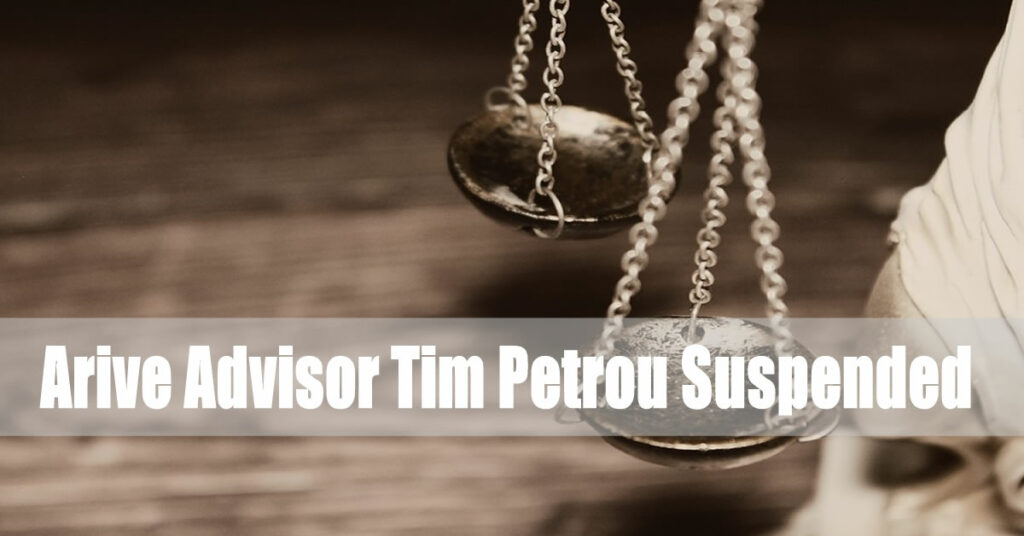Advisor Efthimios (Tim) Petrou of Ronkonkoma, NY, has recently been suspended by the Financial Industry Regulatory Authority (FINRA), on account of allegations of unsuitable and excessive trading in the account of a 67-year-old client. The client from Georgia is understood to have had little understanding of the stock market. Petrou has also been ordered to pay $96,000 as restitution and $5,000 as a fine.
Petrou worked for Arive Capital Markets between July 2015 and July 2022. According to information available in the public domain, he is currently not associated with any firm. A regulatory sanction imposed by FINRA arising from an excessive trading allegation is a disclosure on his profile.
According to FINRA, the agency that regulates and licenses brokers and brokerage firms and mandates the disclosure not only of customer complaints and disputes but also certain other specified financial information that pertains to judgments, liens and bankruptcies, indiscriminate trading in the customer’s account resulted in him coughing up $96,000 in the form of margin interest as well as commissions over 73 recommended trades. The transactions resulted in losses amounting to $17,000.
If you believe you are a broker fraud victim, please call us for a confidential and free consultation at 1-800-856-3352.
Result of the excessive trading
Table of Contents
- The trades created a cost-to-equity ratio of 86%; in other words, to achieve a breakeven, the customer’s investments would need to appreciate by 86%, a tall order at the best of times.
- Another result was an annual turnover rate of 22. The turnover rate in an account stands for the number of times a portfolio has been replaced by another one. A turnover rate tending to 6, with the cost-to-equity ratio being 20%, is generally considered to be in breach of the threshold beyond which it begins to be considered excessive.
Bringing a churning claim
If you have lost money on your stock investments due to churning, you may be able to bring a claim against your stock broker. To be successful, you will need to prove that the broker had control over your account. This control can be express, implied, or de facto. For example, if the broker advised you to buy or sell a stock but did not act on that advice, you may be able to file a claim.
Churning is an aggressive way for stockbrokers to make money. It’s often referred to as “excessive trading” and is a violation of the client’s duty of good faith. In addition to being a breach of duty, churning also constitutes a breach of a fiduciary relationship. If you’ve been a victim of churning, contact a lawyer to learn your rights and discuss your options. In most cases, a broker is liable for the loss in your account, any accrued interest, and any commissions. In some states, you may also be able to recover punitive damages.
While bringing a churning claim against your stock broker can be challenging, it’s important to understand that you’re not alone in dealing with commission-based brokers. Most of these professionals are honest, but some are out to take advantage of unsuspecting investors. The risk of churning is high, but you can take steps to prevent it.
Common questions about churning
The Securities and Exchange Commission (SEC) has strict rules governing stockbrokers, including churning. Brokers must follow these laws and compensate victims of stockbroker misconduct. Churning is a violation of federal and state securities laws. This type of stockbroker misconduct can happen in several different ways.
In order to identify churning, investors must examine their account statements for signs of unnecessary trading or excessive buying and selling. It is important to be vigilant in checking monthly statements, which can reveal any excessive buying and selling and excessive commission charges. In addition, an in-and-out trading pattern can indicate churning. If you suspect this type of behavior, you can file a complaint with the Securities and Exchange Commission.
While it may be difficult to prove churning, it is possible to prove that your broker engaged in excessive trading or was unable to protect you from churning by analyzing their account trading patterns and profits. Arbitration panels can also find evidence of scienter if a broker has been found guilty of churning by looking at the broker’s track record within the industry.
Legal guidance for investors
Haselkonr & Thibaut represents investors across the country who have incurred losses resulting from the fraudulent and/or negligent actions of the brokers they were working with.
If you have concerns that you could be an inadvertent victim of such a scheme, or if you have dealt with Petrou and harbor similar concerns, you could seek a consultation with them at no cost. Their experienced securities attorneys will help you understand your position and explore the best recovery options.
Their cases, mostly, are handled on a contingent basis. In other words, if they take up the case, you don’t need to pay legal fees until they have been successful in recovering on your behalf.
Please call us for a confidential and free consultation at 1-800-856-3352.


